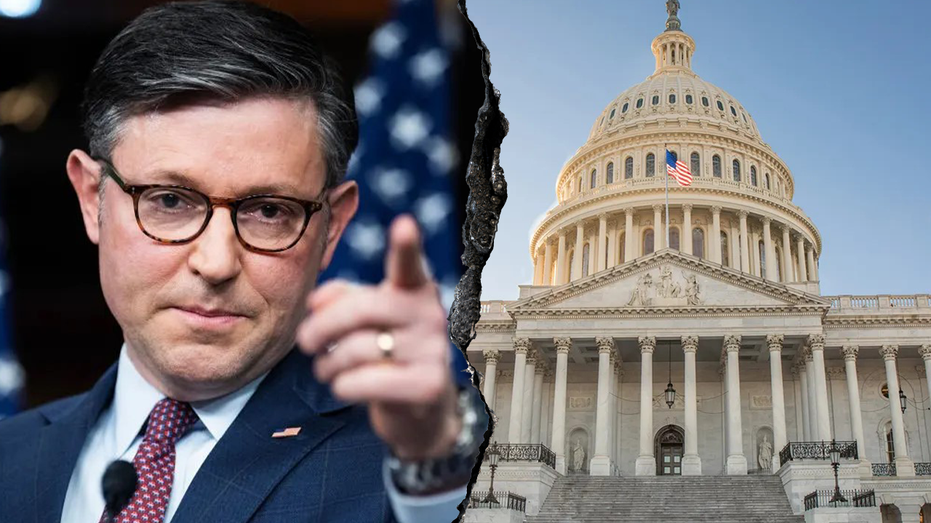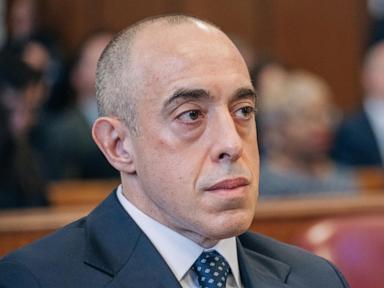The next flashpoint in President Donald Trump’s battle to reshape the federal judiciary is coming — and it’s dividing the right.
Trump recently appeared to declare war on the Federalist Society, the powerful conservative legal advocacy organization that played an essential role in his election both in 2016 and 2024. After one of his first-term appointees ruled against him in a major challenge to his tariffs, Trump launched a public tirade against the former chair of the group, Leonard Leo, who Trump described as a “sleazebag” who “probably hates America” before blaming the group for “bad advice they gave me on numerous Judicial Nominations.”
But the more tangible potential rupture with at least parts of the conservative legal movement is coming over Trump’s decision to nominate Emil Bove — formerly Trump’s criminal defense lawyer, currently Trump’s enforcer at the Justice Department — to the U.S. Court of Appeals for the Third Circuit.
Prominent members of the conservative legal movement have been publicly speaking out against Bove’s nomination, arguing that he would be more loyal to Trump than the rule of law. That in turn has sparked a backlash against Bove’s critics from Trump allies eager to install a new set of judges who may be less tied to the old guard on the right.
It’s a remarkable turn, and it threatens to further destabilize an alliance between Trump and the establishment conservative legal community that has been critical to his presidency and that has produced one of Trump’s most durable political achievements: stocking the judiciary with conservative judges and securing sweeping wins at the Supreme Court, from abortion to affirmative action and presidential immunity.
The outcome of this clash could also have a real impact on how Trump’s second term unfolds. It could influence not just Trump’s next wave of judicial appointments, but how the president’s most aggressive attempts to dramatically expand presidential authority — from the dismantling of huge swathes of the federal government to the unprecedented deployment of the U.S. military in Los Angeles — fare in the courts.
Amid Trump’s swipes at Leo and his calls to impeach judges who have impeded his agenda, the nomination of Bove may seem like a modest step in the president’s never-ending legal drama. But it has raised serious red flags among longtime members of the Federalist Society — as well as concerns about the long-term trajectory of the federal courts and even the Supreme Court.
The conservatives’ issue with Bove is not about ideology, but about his fitness to be a judge.
Most notably, Bove was responsible for dismissing the criminal case against New York Mayor Eric Adams using arguments that were — according to the presiding judge — “unsupported by any objective evidence,” “pretextual” and “unsubstantiated.” The controversy appears to have resulted from Trump’s decision to give Adams a pass in order to ensure the mayor’s support for the administration’s immigration crackdown and perhaps to thumb his nose yet again at the Biden Justice Department, which brought the charges against Adams in the first place.
“His involvement in the Adams prosecution is really troubling, and it suggests someone who’s eager to do the bidding of his political masters before seriously looking at legal constraints and ethics,” Gregg Nunziata, a Federalist Society member who once served as a senior aide to Senate Republicans on judicial nominations, told me.
Bove also dismissed or transferred DOJ career officials, gathered the names of FBI agents who had worked on the Jan. 6 investigation, and is one of the leads on DOJ’s so-called Weaponization Working Group, which is reviewing the conduct of the federal prosecutors and FBI agents who pursued Trump and investigated the siege of the Capitol on Jan. 6.
In a social media post announcing the nomination, Trump praised Bove as a MAGA foot soldier: “Emil is SMART, TOUGH, and respected by everyone. He will end the Weaponization of Justice, restore the Rule of Law, and do anything else that is necessary to, MAKE AMERICA GREAT AGAIN.”
According to Nunziata, Bove’s handling of the Adams case alone warrants serious reservations about putting him on the bench, but the concerns run deeper. That is because the nomination comes “more broadly in an environment where the administration seems more and more hostile to law, and elements of the conservative legal movement — supporters and allies of the president — have been pushing the president to nominate judges that are committed not to a neutral application of the law, but to the president’s agenda.”
“It makes this nomination a real test case of whether the Senate will allow the president to fill the bench with loyalists,” he said.
It remains unclear how that test will shake out.
I recently surveyed the entire Senate Republican conference to ask whether individual senators would vote for or against Bove, and few replied. The only substantive response I got was from Utah GOP Sen. Mike Lee’s office, which said that Lee “supports the nomination of Emil Bove, and looks forward to voting for him.” In fairness, the nomination is still in its early stages, and the Senate Judiciary Committee has yet to hold a hearing. For now, it’s easiest to withhold comment.
“I haven’t heard people saying that they’re kind of pre-committed to supporting the nomination,” Nunziata said. “I’ve heard people saying they understand the concerns and they want to hear from the nominee and see how he presents himself.”
But based on how Trump’s second term has gone so far, it’s clear Senate Republicans will be reluctant to tank one of his nominees.
That’s particularly true because the opposition to Bove has produced an aggressive defense from Trump’s most ardent defenders in the conservative legal community. The Article III Project quickly produced a stream of articles and commentary supporting Trump’s choice — largely, it seemed, on the grounds that Bove would be a reliable supporter of Trump’s political agenda and legal positions.
Mike Davis, the group’s founder and onetime counsel to Senate Judiciary Chairman Chuck Grassley (R-Iowa), lauded the appointment while tweaking both ends of the opposition. “The left fears Emil Bove because he’s effective,” Davis said. “The establishment right resents him because he refuses to play by their rules.”
Longtime members of the conservative legal establishment also worry that Bove, if confirmed to the Third Circuit, could become a leading contender to fill the next vacancy on the Supreme Court, if and when that happens in Trump’s current term.
“I’m absolutely concerned about that,” said Nunziata, who went on to say that he is worried about the broader consequences for the country if partisan loyalists are the only ones who head to the bench under Trump. “We need checks and balances to defend our liberties,” he said, and “Congress has proven a weak check lately.”
Trump’s push for Bove in the current political climate could also backfire on him. Trump may end up with fewer vacancies to fill in his second term if traditional conservative judges decide to think twice about retiring and allowing Trump to fill their slot.
“Just yesterday, a very conservative appellate judge told me that s/he wouldn’t take senior status because of concerns over who would be picked as successor,” the longtime conservative legal warrior Ed Whelan, who is also a Bove skeptic, wrote on X recently.
A large and perhaps uncomfortable question for mainstream legal conservatives looms over all of this: What responsibility does the Federalist Society itself have over the state of American politics at the moment?
Few people would even know who Emil Bove is right now if the Federalist Society-approved conservative justices on the Supreme Court had not devised a doctrine of presidential criminal immunity last summer that allowed Trump to bypass a trial on the 2020 election indictment, arguably his biggest hurdle to the White House.
The legal theories that the Trump administration has invoked in support of its most aggressive moves on a range of issues also have their roots in longstanding conservative legal doctrines promoted by the Federalist Society and other members of the conservative or GOP legal establishment.
You can trace Trump’s position on congressional appropriations — essentially, that he can ignore them — to President Richard Nixon.
You can trace Trump’s position on staffing the executive branch — effectively, that he can fire anyone he wants whenever he wants, despite what Congress wrote into law — to the unitary executive theory developed under President Ronald Reagan.
And you can trace Trump’s position on laws passed by Congress — effectively, that he can ignore whichever ones he wants, particularly if he claims that there is some sort of emergency — to President George W. Bush and also, famously, to Nixon.
The criticism of these conservative legal theories was not obscure. Many lawyers and scholars argued over the years that these doctrines, if seriously adopted, would give too much authority to the president; that they would improperly diminish the role of our elected representatives in Congress; that they would eviscerate independent agencies and diminish the professionalism of the civil service; and that they would make the presidency both monarchical in nature and highly vulnerable to corruption.
In the early months of Trump’s second term, the critics are looking prescient.
Given all of that, the Federalist Society and the conservative legal establishment that supported Trump’s ascendance may end up learning a lesson that many business and political figures have learned over the years — that Trump will use you when it suits him, then toss you aside, and perhaps even run you over, the moment you become an impediment to his objectives. You can go from ally to adversary in the blink of an eye.
Once that happens, you can disavow Trump all you want, but you cannot wipe the historical record or abandon your responsibility for what happened in the meantime — or for what comes in the future as a result of your past support. In the law, we call this “but-for” causation.
The Republican Party and the conservative legal establishment will soon face a series of tests that could determine whether Trump has fully overtaken them.
Among them: Will Senate Republicans fall in line on Bove and confirm him, as they have with virtually every other Trump appointment in his second term?
Will Supreme Court Justices Samuel Alito or Clarence Thomas step down during Trump’s second term — thereby tacitly giving their approval to whomever Trump nominates to replace them?
Perhaps above all, how will the current Republican appointees on the court resolve the onslaught of momentous legal issues coming before them as a result of Trump’s reelection — through principles or through politics?
Many members of the conservative legal establishment may have to come to grips with their role in Trump’s election and reelection and how he governs in his second term. They got what they wanted — among other things, a Supreme Court that would overturn Roe v. Wade — but at what long-term cost?
When I posed a version of this question to Nunziata, he paused to gather his thoughts before offering some diplomatic observations about his colleagues in the conservative legal movement.
“I think maybe for understandable reasons, historic reasons, or the nature of a group of lawyers,” he said, “the Federalist Society and the broader conservative legal movement has been focused on the courts for two generations to such a degree that too many of its members ignored the real breakdown of constitutional values on the right and the country at large,” as well as “the dysfunction in the executive and the legislative branches.”
“They were focused on strengthening the courts by their lights,” Nunziata continued, “while not seeing the rest of the constitutional structure decaying under their feet.”
.png)














 English (US)
English (US)